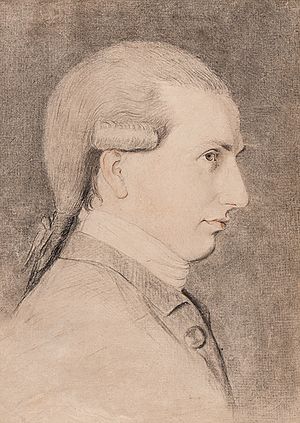Richard Hey facts for kids
Richard Hey (born 1745, died 1835) was an English scholar, writer, and essayist. He was known for writing against gambling.
Contents
Richard Hey's Early Life and Education
Richard Hey was born in Pudsey, near Leeds, on August 22, 1745. He was the younger brother of John Hey and William Hey.
He went to Magdalene College, Cambridge University. In 1768, he earned his first degree, a Bachelor of Arts (BA). By 1771, he received his Master of Arts (MA) while at Sidney Sussex College. Later, in 1779, he earned a law degree, called a Legum Doctor (LLD).
Richard Hey's Career Path
In 1771, Richard Hey became a lawyer, or was "called to the bar" at the Middle Temple. He was allowed to work at a special court called Doctors' Commons. However, he did not get many cases, so he stopped working as a lawyer.
From 1782 to 1796, Hey worked at Magdalene College. He was a fellow, which means he was a senior member of the college, and also a tutor, teaching students. He was also chosen as an "esquire bedell", a university official.
Richard Hey lived to be 90 years old. He passed away on December 7, 1835, in Hertingfordbury, near Hertford.
Richard Hey's Writings and Ideas
Richard Hey wrote many important works during his life.
Writing About Government and Society
In 1776, he published a book called Observations on the Nature of Civil Liberty and the Principles of Government. This book shared his thoughts on how people should be free and how governments should work.
His most famous work was a Dissertation on the Pernicious Effects of Gaming. This essay won a prize of fifty guineas from Cambridge University. It was first printed in 1783. He updated it, and the third edition came out in 1812.
In 1784, Hey won another prize for his Dissertation on Duelling. This essay talked about the dangers of dueling, which was a common practice at the time where two people would fight to settle an argument. This work also had a third edition in 1812. The three essays were published together in 1812.
Other Notable Works
In 1792, Hey wrote Happiness and Rights. This book was a response to Rights of Man by Tom Paine, a very famous writer of the time.
He also wrote a play called The Captive Monarch in 1794. It was a tragedy based on the story of Louis XVI, a king of France. In 1796, he published a novel, a longer story, called Edington.
His last known work was Some Principles of Civilisation, with detached thoughts on the Promotion of Christianity in British India. This was published in 1815.
Richard Hey also wrote articles for scientific journals like Philosophical Transactions. He even helped edit a pamphlet about an Egyptian mummy, including details about its anatomy.
 | May Edward Chinn |
 | Rebecca Cole |
 | Alexa Canady |
 | Dorothy Lavinia Brown |


